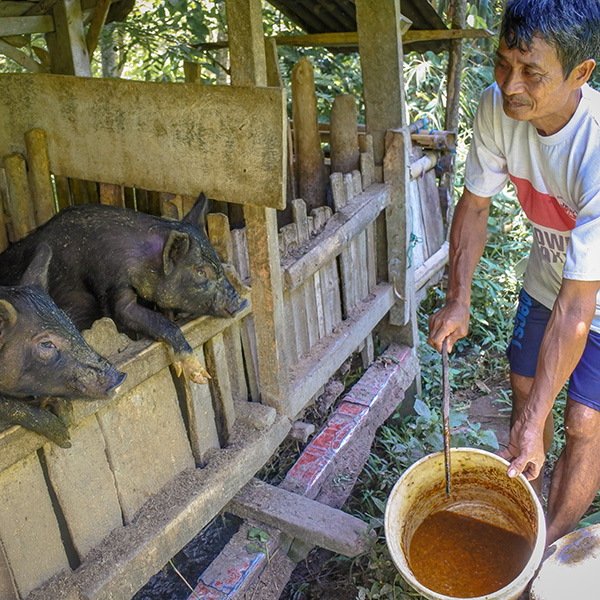Stories of Change

Buttu Tasik feeding his pig supplements.
Healthier pigs, more secure families in Indonesia
Like many of his neighbors in Indonesia, Buttu Tasik raises pigs and farms to make a living. He lives with his wife and four children in a village in South Sulawesi. And like many of his neighbors, he is concerned about the toll climate change is taking on his farm. “Changes in the weather here are quite extreme,” he says. “We have not yet been able to cope with the unpredictability of the weather and its impact on our planting schedule. This leads to financial insecurity.”
Shifting climates mean that Tasik and his neighbors aren’t sure that they are planting at the right time, and it can mean poor harvests. That’s why it’s so important that they have multiple sources of income and aren’t totally reliant on farming. “By raising pigs to sell, we have money to help us meet our daily needs while waiting for better harvests,” he says.
Tasik is the chair of the farmers group in his community. He started the group as part of the CWS Disaster Risk Reduction through Enhanced Adaptive Measures–or simply, DREAM–program. DREAM is designed to help farming families handle natural disasters better. One of the best ways to make sure that you will still be able to earn an income after a disaster is to diversify the ways in which you make money. Another is to learn new farming techniques that can help reduce the impact of climate change.
CWS and a partner recently hosted a workshop about making food supplements for livestock. Tasik attended and wasted no time putting what he learned into practice. He mixed papaya, brown sugar, betel nut, turmeric and lemongrass to create a nutrient-rich paste for his pigs. He added some water like he learned in the workshop and then left it all to ferment for 45 days. to which he added water before leaving the mixture to ferment for 45 days. “The mixture is fragrant, so I also want to eat it,” he joked when he showed the mixture to some CWS team members.
“Now, I mix two tablespoons of the supplement into each feeding. After just two months, my seven pigs are growing a bit faster compared to previous years,” he observes.
Tasik was the first in his group to test out the mixture, and he likes the supplement because it uses ingredients he has on his farm or can easily find in the village. Plus, as a bonus, he began to notice that after a couple of weeks of using the supplement, the pig manure didn’t smell.
After seeing Tasik’s success, several other farmers in his group wanted to follow his lead. “When I saw others using the supplement, and once we had enough manure that didn’t smell bad, we started using the manure as fertilizer,” one said. “We were hesitant to do this before because we didn’t want to disturb our neighbors with the smell.”
Stories like this are exactly why we have the DREAM project. Farmers have opportunities to access information. Armed with this knowledge, they create simple, maintainable systems to help increase their productivity and strengthen their livelihoods. This means coping with the impact of climate change on their crops.
